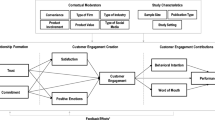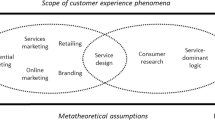Abstract
Corporate greed has received increasing attention in recent years with various stories hitting the headlines, particularly after the global financial crisis and the ensuing negative attitudes toward banks. Customer satisfaction and corporate social responsibility are known to have a positive effect on corporate reputation among customers, but perceived corporate greed is likely to impede their effect. Corporate greed, customer satisfaction, corporate social responsibility and corporate reputation are considered, and a research model is proposed. Results indicate that the effect of corporate greed is stronger on corporate social responsibility than on customer satisfaction, implying that corporate social responsibility activities may be futile if the company is perceived to be acting greedily by its customers. Thus, perceptions of corporate greed need to be dealt with swiftly, to enable management to enhance the corporate reputation of the firm.

Similar content being viewed by others
References
Abrantes-Metz, R.M., M. Kraten, A.D. Metz, and G.S. Seow. 2012. Libor manipulation? Journal Banking Finance 36: 136–150.
Barnett, M.L. 2007. Stakeholder influence capacity and the variability of financial returns to corporate social responsibility. Academy of Management Review 32(3): 794–816.
Carmeli, A., and A. Tishler. 2005. Perceived organizational reputation and organizational performance: An empirical investigation of industrial enterprises. Corporate Reputation Review 8(1): 13–30.
Carty, V. 2002. Technology and counter-hegemonic movements: The case of Nike corporation. Social Movement Studies 1(2): 129–146.
Check, H.E. 2014. Activists sound alarm on tiered drug prices. Nature 509(7501): 412.
Cohn, A., E. Fehr, and M.A. Maréchal. 2014. Business culture and dishonesty in the banking industry. Nature 516: 86–89.
Clarkson, M. 1995. A stakeholder framework for analyzing and evaluating corporate social performance. Academy of Management Review 20: 92–117.
Crossley, C.D. 2009. Emotional and behavioral reactions to social undermining: A closer look at perceived offender motives. Organizational Behavior and Human Decision Processes 108: 14–24.
Day, R.L. 1977. Extending the concept of consumer satisfaction. Advances in Consumer Research 4(1): 149–154.
Dorfman, J. 2013. Workers should be very thankful that corporations are so greedy. Forbes. http://www.forbes.com/sites/jeffreydorfman/2013/12/15/corporate-greed-is-not-selective-so-it-cannot-hold-down-wages/#5604096a4bcd. Dec 15, 2013. Accessed July 13, 2016.
Dowling, G., and P. Moran. 2012. Corporate reputations. California Management Review 54(2): 25–42. (winter).
Dunbar, R.L.M., and J. Schwalbach. 2000. Corporate reputation and performance in Germany. Corporate Reputation Review 3(2): 115–123.
Fombrun, C.J., L.J. Ponzi, and W. Newburry. 2015. Stakeholder tracking and analysis: The RepTrak system for measuring corporate reputation. Corporate Reputation Review 18(1): 3–24.
Fombrun, C., and M. Shanley. 1990. What’s in a name? Reputation building and corporate strategy. Academy of Management Journal 33(2): 233–258.
Fombrun, C.J. 1996. Reputation. Boston: Harvard Business School Press.
Freeman, R.E. 1984. Strategic management: A stakeholder approach. Boston: Pitman.
Friedman, M. 1962. Capitalism and freedom. Chicago: University of Chicago Press.
Garberg, N.A., and C. Fombrun. 2006. Corporate citizenship: Creating intangible assets across institutional environment. Academy of Management Review 31: 329–346.
Gatti, L., A. Caruana, and I. Snehota. 2012. The role of corporate social responsibility and perceived quality on corporate reputation, and purchase intention: Implications for brand management. Journal of Brand Management 20(1): 65–76.
Gregoire, Y., D. Laufer, and T.M. Tripp. 2010. A comprehensive model of customer direct and indirect revenge: Understanding the effects of corporate greed and customer power. Journal of the Academy of Marketing Sciences 38: 738–758.
Girouard, J.E. 2018. How post-recession corporate greed may have set us up for an even bigger crash. Manhattan: Forbes.
Holland, S.P., E.T. Mansur, N.Z. Muller, and A.J. Yates. 2016. Damages and expected deaths due to excess NOx emissions from 2009 to 2015 Volkswagen diesel vehicles. Environmental Science and Technology 50(3): 1111–1117.
Hayes, A.F. 2013. Introduction to mediation, moderation, and conditional process analysis: A regression-based approach. New York: Guilford Press.
Kantšukov, M., and D. Medvedskaja. 2013. From dishonesty to disaster: The reasons and consequences of rogue traders’ fraudulent behavior. In (Dis)Honesty in management, vol. 10, ed. Tiia Vissak and Maaja Vadi, 147–165., Advanced series in management Bingley: Emerald Group Publishing Limited.
Kaiser, H. 1974. An index of factor simplicity. Psychometrika 39: 31–36.
Lui, A. 2015. Greed, recklessness and/or dishonesty? An investigation into the culture of five UK banks between 2004 and 2009. (Northern Rock, Royal Bank of Scotland, Barclays, Lloyds Banking Group, and HSBC), Journal of Banking Regulation 16(2): 106–129.
Mirvis, P.H. 2012. Reputation and corporate social responsibility: A global view. In Corporate reputation: Managing opportunities and threats, ed. R.J. Burke, G. Martin, and G.L. Cooper, 89–111. Surrey: Gower Publishing Ltd.
Norris, F. 2013. A troubling survey on global competition. New York Times. http://www.nytimes.com/2013/05/18/business/economy/a-troubling-survey-on-global-corruption.html May 17, 2013. Accessed July 12, 2016.
Nunnally, J.C. 1967. Psychometric theory. New York: McGraw-Hill.
Oliver, R.L. 1980. A cognitive model of the antecedents and consequences of satisfaction decisions. Journal of Marketing Research 17: 460–469.
Oliver, R.L. 1997. Satisfaction: A behavioral perspective on the consumer. New York: McGraw-Hill.
Ponzi, L.J., C.J. Fombrun, and N.A. Gardberg. 2011. RepTrak ™ pulse: Conceptualizing and validating a short-form measure of corporate Reputation. Corporate Reputation Review 14(1): 15–35.
Rose, C., and S. Thomsen. 2004. The impact of corporate reputation on performance: Some Danish evidence. European Management Journal 22(2): 201–210.
Saad, G. 2007. The evolutionary basis of consumption. Mahwah, NJ: Erlbaum.
Singh, J., M. Sanchez, and I.R. del Bosque. 2008. Understanding corporate social responsibility and product perceptions in consumer markets: A cross-cultural evaluation. Journal of Business Ethics 80: 597–611.
Spence, A.M. 1974. Market signalling: Informational transfer in hiring and related screening procedures. Cambridge: Harvard University Press.
Stanaland, A.J.S., M.O. Lwin, and P.E. Murphy. 2011. Consumer perceptions of the antecedents and consequences of corporate social responsibility. Journal of Business Ethics 102: 47–55.
Sullivan, M. 1990. Measuring image spillovers in umbrella branded products. Journal of Business 63(3): 309–329.
Tickle, P. 2004. Greed: The seven deadly sins. Oxford: Oxford University Press.
Walsh, G., K. Dinnie, and K.-P. Wiedmann. 2006. How do corporate reputation and customer satisfaction impact customer defection? A study of private energy customers in Germany. Journal of Services Marketing 20(6): 412–420.
Walsh, G., V.W. Mitchell, P.R. Jackson, and S.E. Beatty. 2009. Examining the antecedents and consequences of corporate reputation: A customer perspective. British Journal of Management 20(2): 187–203.
Weigelt, K., and C. Camerer. 1988. Reputation and corporate strategy: A review of recent theory and applications. Strategic Management Journal 9: 443–454.
World Business Council for Sustainable Development. Report by Watts P., Lord Holme. 1999. Corporate social responsibility: Meeting changing expectations. World Business Council for Sustainable Development Publications: Geneva, ISBN No. 2-94-0240-03-5. http://www.wbcsd.org/pages/edocument/edocumentdetails.aspx?id=82&nosearchcontextkey=true. Accessed: July 13, 2016.
Yoon, E., H.J. Guffey, and V. Kijewski. 1993. The effects of information and company reputation on intentions to buy a business service. Journal of Business Research 27: 215–228.
Author information
Authors and Affiliations
Corresponding author
Rights and permissions
About this article
Cite this article
Caruana, A., Vella, J., Konietzny, J. et al. Corporate greed: its effect on customer satisfaction, corporate social responsibility and corporate reputation among bank customers. J Financ Serv Mark 23, 226–233 (2018). https://doi.org/10.1057/s41264-018-0050-0
Revised:
Published:
Issue Date:
DOI: https://doi.org/10.1057/s41264-018-0050-0




